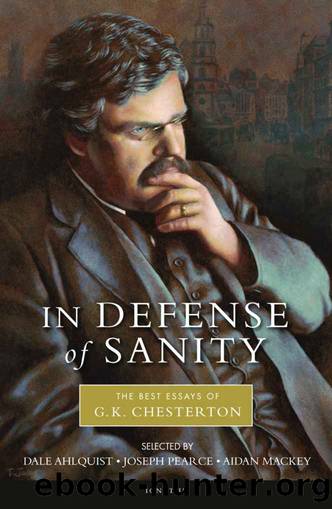In Defense of Sanity by G.K. Chesterton

Author:G.K. Chesterton [Chesterton, G.K.]
Language: eng
Format: epub
Tags: Spiritual & Religion
ISBN: 9781586174897
Publisher: Ignatius Press
Published: 2011-10-20T05:00:00+00:00
On Original Sin
Come to Think of It, 1930
Once upon a time when Mr. H. G. Wells was setting forth on his varied and splendid voyage from Utopia to Utopia, he announced as a sort of watchword or war-cry that the new world would have nothing to do with the idea of Original Sin. He did not specially speak, and, indeed, there was no reason for him to speak, about his other beliefs or unbeliefs. He had not then compared the Trinity to a dance; but neither had he called adoring multitudes to the shrine of the Invisible King. But, standing at the end of the great scientific nineteenth century, he thought it time to announce that the one doctrine he did not believe in was Original Sin. Standing at the beginning of the still more scientific twentieth century, Mr. Aldous Huxley calmly announces that the one doctrine he does believe in is Original Sin. He may be a sceptic or a heretic about many things, but on that point he is quite orthodox. He may not hold many theological dogmas, but about this dogma he is quite dogmatic. There is one fragment of the ancient creed which he not only clings to, but declares to be necessary to all clear minds of the new generation. And that is the very fragment which Mr. Wells threw away thirty years ago, as something that would never be needed anymore. The stone that the builder of Utopia rejected. . . .
It is not a mere verbal coincidence that original thinkers believe in Original Sin. For really original thinkers like to think about origins. That should be obvious even to the negative thinkers of the nineteenth-century tradition, who for two or three generations claimed all originality, all novelty, all revolutionary change of thought for a book called The Origin of Species. But it is even more true of moral discovery than of material discovery; and it is even more true of the twentieth-century reaction than of the nineteenth-century revolution. Men who wish to get down to fundamentals perceive that there is a fundamental problem of evil. Men content to be more superficial are also content with a superficial fuss and bustle of improvement. The man in the mere routine of modern life is content to say that a modern gallows is a relatively humane instrument or that a modern cat-oâ-nine tails is milder than an ancient Roman flagellum. But the original thinker will ask why any scourge or gibbet was ever needed, or ever even alleged to be needed? And that brings the original thinker back to original sin. For that is not affected as a universal thing by whether we approve or disapprove of the particular things. Whether we call it infamous tyranny or inevitable restraint, there is some sort of sin either in the scourger or the scourged.
Nevertheless, I often feel that the original thinker is not quite original enough. I mean that he does not get quite so near to the truth as the old tradition could take him.
Download
This site does not store any files on its server. We only index and link to content provided by other sites. Please contact the content providers to delete copyright contents if any and email us, we'll remove relevant links or contents immediately.
Machine Learning at Scale with H2O by Gregory Keys | David Whiting(4289)
Never by Ken Follett(3930)
Fairy Tale by Stephen King(3365)
Reminders of Him: A Novel by Colleen Hoover(3070)
The Man Who Died Twice by Richard Osman(3060)
Will by Will Smith(2901)
Rationality by Steven Pinker(2348)
It Starts With Us (It Ends with Us #2) by Colleen Hoover(2327)
Can't Hurt Me: Master Your Mind and Defy the Odds - Clean Edition by David Goggins(2319)
Friends, Lovers, and the Big Terrible Thing by Matthew Perry(2211)
The Becoming by Nora Roberts(2183)
The Stranger in the Lifeboat by Mitch Albom(2110)
Love on the Brain by Ali Hazelwood(2053)
New Morning Mercies: A Daily Gospel Devotional by Paul David Tripp(1906)
The Strength In Our Scars by Bianca Sparacino(1834)
HBR's 10 Must Reads 2022 by Harvard Business Review(1832)
A Short History of War by Jeremy Black(1831)
A Game of Thrones (The Illustrated Edition) by George R. R. Martin(1707)
Never Finished: Unshackle Your Mind and Win the War Within by David Goggins(1694)
